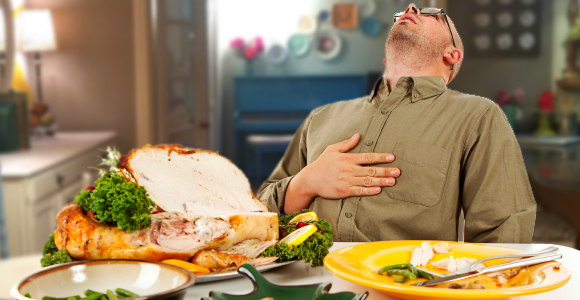Healthy Eating This Holiday Season
Halloween has come and gone, and many people overindulged in sweets, despite their best efforts not to. The bowl of individually wrapped chocolates and hard candies sits on many people’s desks, just begging to be eaten. Halloween candies are called “fun sized” for a reason – who doesn’t find pleasure in unwrapping a sweet treat?
Unfortunately, for many of us, that very bowl of goodies often triggers two consecutive months of poor food and drink choices. This downward spiral often ends the morning of January 1st, a day when many people wake up, resolving to make changes to their diet and lifestyle. The regret over the last 60 days of overindulgence leads people to their New Year’s resolutions of getting back to the gym, losing those extra pounds, changing their diet… these common resolutions are often a result of guilt and shame over the weight they’ve put on over the holidays.
Thanksgiving is a time when people often eat so much that they feel sick or enter a “food coma” – people often blame the chemical tryptophan found in turkey for their post-meal sleepiness, but in reality, any large quantity of food can cause someone to pass out on the couch. Add pumpkin pie, wine, beer, and liquor to this, and the caloric factor increases substantially. Often, many people with large families attend separate Thanksgiving dinners during the day – and it would be rude to not try your mother-in-law’s “famous” stuffing, right?
In the month of December, even people who usually have a very balanced diet find themselves overeating or bingeing, often for days at a time. After all, from a food standpoint, Chanukah is essentially an 8 day long celebration of fried carbohydrates. And Christmas parties, between friends, family, and the workplace, often lead people to overindulge in rich foods all throughout the second half of the month. For many people, the December holidays – especially New Year’s Eve – are a time of “eat, drink, and be merry,” and the overindulgence in alcohol is a holiday activity that is culturally engrained in much of the world.
So, how can someone be mindful of their body and their eating/drinking habits during these two months, where food and alcohol are so celebrated and available? There are some tricks and tips that we’ve embraced to stay balanced during this tempting time.
First and foremost – your New Year’s resolutions to eat less, drink less, and stay in shape don’t have to start when you’ve hit bottom on January 1st. If you begin your journey to change your lifestyle now, you will have a much easier time navigating these next two months because you will be motivated to maintain healthy patterns instead of breaking them. Talking to a dietician, nutritionist, or holistic medicine doctor about a holiday diet plan can help you establish some goals to work towards.
Second – be mindful of your body and have a “food plan” for the days you think you will struggle with the most. Be aware of your hunger levels throughout the day. Just because food is free and delicious does not mean you have to overindulge – no need to eat a large portion when a smaller portion will satisfy your body’s needs.
Third – use other people in your life to help you stay accountable. Tell your friends, loved ones, and coworkers about your plan to eat healthily this holiday season. If you’re facing a particularly tempting situation and you are really committed to balanced eating, you can reach out on the phone to an understanding friend who can help set your head straight. And for New Year’s Eve, volunteering to be the designated driver is a good way to make sure that you won’t overindulge in alcohol.
All in all, a balanced diet can be implemented during the holidays without you feeling like you’re depriving yourself. And if you fall off the wagon and overeat one evening – not all is lost. Tomorrow is a new day and you can step easily back on the road to wellness with a little willpower and motivation

